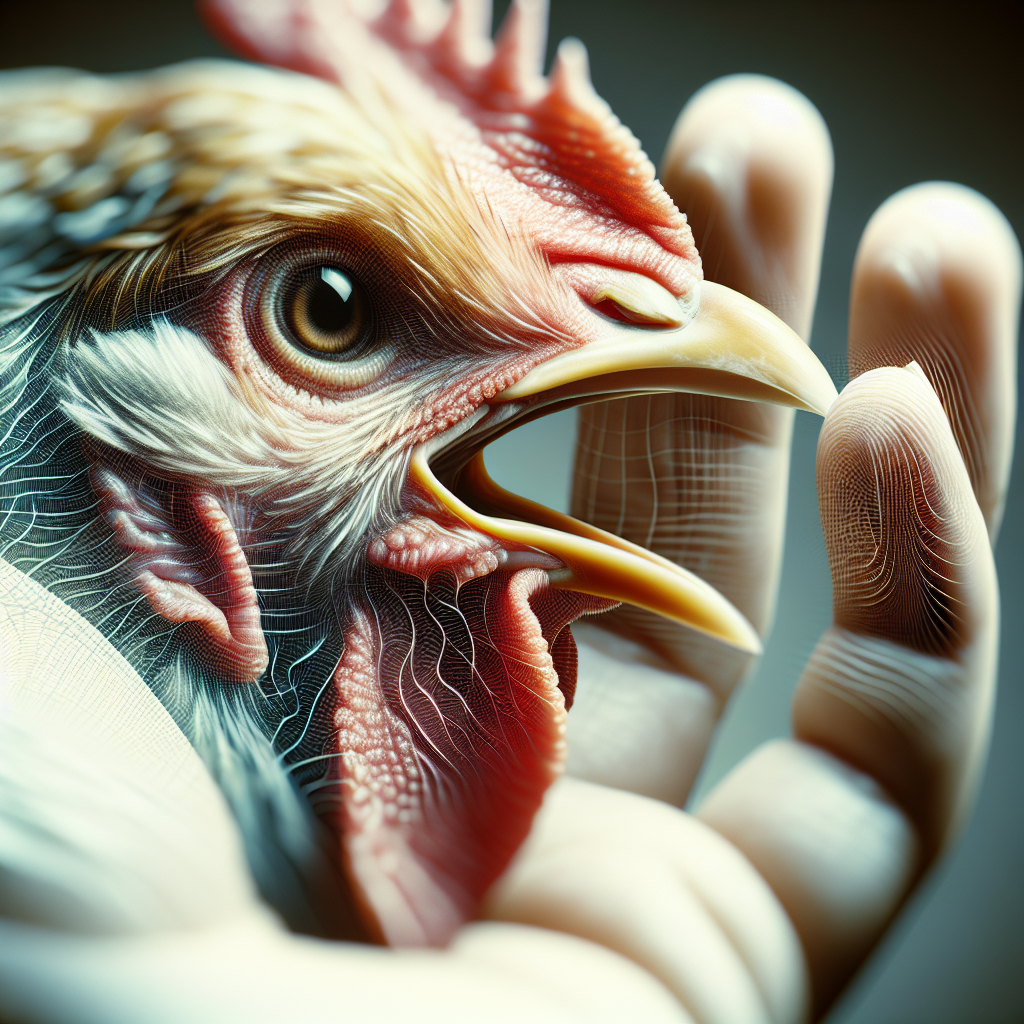Have you ever wondered how to make sure that chickens at different stages of life, all within the same flock, receive the appropriate feed? It can be a bit tricky, but fear not, there are practical solutions to this challenge. Whether you have chicks, pullets, or mature hens, it is essential to provide them with the right nutrition for their specific needs. With a few simple adjustments and thoughtful planning, you can ensure that all your feathered friends are getting exactly what they need to thrive and stay healthy.
Understanding the Different Life Stages of Chickens
Chickens go through various life stages, and understanding these stages is crucial for adequately meeting their nutritional needs. By categorizing chickens into different developmental stages, you can provide them with the appropriate feed for optimal growth and health.
Determining the Developmental Stages
To determine the developmental stages of your chickens, you need to observe their physical characteristics and behaviors. The primary stages include chicks, young chickens, adolescent chickens, laying hens, and meat chickens.
Chicks are newly hatched chickens that require special care and nutrition to support their rapid growth and development. Young chickens refer to birds that have outgrown their chick stage but aren’t mature enough to lay eggs or be raised for meat. Adolescent chickens are approaching maturity and need specific nutrients to support their growth. Laying hens are mature females that produce eggs regularly, requiring feed rich in calcium and other essential nutrients. Meat chickens, also known as broilers, are raised for meat production and have different nutritional requirements.
Identifying Specific Nutritional Requirements
Each developmental stage of chickens necessitates different nutritional requirements. Chicks require a high-protein starter feed to support their growth, typically containing around 18-20% protein. This feed also contains essential vitamins and minerals vital for their overall health.
Young chickens transitioning from chick to adolescence require a grower feed to support their continued growth. The protein levels in grower feed are around 16-18%, providing the needed nutrition for strong bones, feathers, and muscle development.
Adolescent chickens, as they near maturity, benefit from a developer feed. This feed typically contains around 14-16% protein and assists in the final stages of growth, preparing them for their role as laying hens or meat chickens.
Laying hens have specific nutritional requirements to support egg production. Layer feed is rich in calcium, usually containing 16-18% protein to ensure the hens have enough nutrients for eggshell formation and overall health. It’s important to note that layer feed should only be fed to chickens that have reached maturity and are actively producing eggs.
For those raising meat chickens, providing a specialized broiler feed is crucial. This high-protein feed with relatively lower calcium levels ensures rapid growth and efficient meat production.
Providing the Right Feed Based on Life Stages
Ensuring that each chicken receives appropriate feed according to its life stage is vital for their overall health and productivity. Let’s explore the different types of feed suitable for each stage:
Starter Feed for Chicks
When chicks hatch, they depend on a starter feed specifically formulated for their early growth. The high protein content in the starter feed aids in muscle and bone development. This feed also contains essential vitamins and minerals to support their immune system and overall health.
Grower Feed for Young Chickens
As chicks transition into young chickens, they require a grower feed that continues to support their growth. Grower feed is lower in protein than starter feed but still provides the necessary nutrients for bone development, feather growth, and overall health.
Developer Feed for Adolescent Chickens
Adolescent chickens need developer feed to assist in their final stages of growth and preparation for adulthood. This feed contains a balanced amount of protein, vitamins, and minerals to promote strong bone structure, muscle development, and overall health.
Layer Feed for Laying Hens
Once chickens reach maturity and begin laying eggs, it’s essential to provide them with layer feed. Layer feed has higher calcium levels to support eggshell formation and quality. It also contains the necessary nutrients to maintain the hen’s overall health and productivity.
Broiler Feed for Meat Chickens
Meat chickens, or broilers, have different nutritional requirements than laying hens. Broiler feed is specially formulated to promote rapid growth and efficient meat production. It typically contains a high protein content combined with lower calcium levels to support their particular needs.
Managing Feed in a Mixed Flock
When keeping chickens of different life stages in the same flock, managing their feed becomes slightly more challenging. However, with the right strategies in place, you can ensure that all chickens receive the appropriate nutrition. Here are some tips for managing feed in a mixed flock:
Separating Chickens by Life Stage
To avoid any feed-related issues, consider separating chickens into different coops or enclosures based on their life stage. This segregation ensures that each group can access the appropriate feed without the risk of nutritional imbalances or other complications.
Using Feeders with Adjustable Openings
Using feeders with adjustable openings is a practical solution for managing a mixed flock. By adjusting the feeder’s size, you can control the access of different chickens to their respective feeds. This helps prevent younger chickens from consuming feed intended for laying hens or broilers.
Offering Multiple Feeding Stations
Creating multiple feeding stations within the flock’s living space allows chickens to choose their preferred area. This approach reduces competition for feed and ensures that each life stage has easy access to its specific feed.
Monitoring Chickens’ Health and Growth
Regularly monitoring your chickens’ health and growth is crucial for identifying any potential issues and making necessary adjustments to their feed and care. Here are some essential aspects to consider when monitoring your flock:
Regularly Weighing Chickens
Weighing chickens on a regular basis helps you track their growth progress. By comparing the weights of individual birds to reference charts, you can determine if each chicken is growing at an appropriate rate. Any significant deviations may indicate a need for adjustment in their feed or overall care.
Observing Feeding Behavior
Closely observe your chickens’ feeding behavior to ensure that each life stage is consuming its appropriate feed. Pay attention to any signs of excessive or insufficient feeding, as these can be indicators of potential health or nutritional issues.
Maintaining a Health Record
Keeping a detailed health record for each chicken is essential for detecting any recurring health issues or patterns. Note down any changes in weight, feeding behavior, egg production, or general well-being. A comprehensive health record helps you identify trends and seek appropriate veterinary assistance if needed.
Consulting a Poultry Nutritionist or Veterinarian
In complex situations or if you’re uncertain about the nutritional requirements of your chickens, it’s always beneficial to seek professional advice from a poultry nutritionist or veterinarian. These experts can provide guidance tailored to your flock’s specific needs.
Seeking Professional Advice
Poultry nutritionists or veterinarians can assess your current feeding practices, identify any potential gaps, and recommend appropriate changes or adjustments. They can help ensure that your chickens receive the right feed based on their life stage, reducing the risk of nutritional deficiencies or imbalances.
Following Customized Feed Plans
A poultry nutritionist or veterinarian can create a customized feed plan for your mixed flock, addressing the unique needs of each life stage. This plan will consider factors such as breed, age, health, and production goals. Following a customized feed plan helps optimize nutrition and overall flock health.
Considerations for Homemade Feed
While commercial feeds are readily available and formulated to meet different life stages, some poultry owners may choose to prepare homemade feed. If you opt for homemade feed, it’s essential to consider the following factors to ensure your flock’s nutritional needs are met:
Understanding Nutritional Requirements
Acquiring a deep understanding of the nutritional requirements of each life stage of chickens is crucial when preparing homemade feed. Research and consult reputable sources to ensure you include the necessary nutrients in appropriate proportions.
Balancing Ingredients
Homemade feed requires balancing various ingredients to achieve the desired nutritional profile. Consulting a poultry nutritionist or veterinarian can help you determine the appropriate ratios and ensure balanced nutrition for your flock.
Ensuring Proper Storage
Proper storage of homemade feed is critical to maintain its nutritional value and prevent spoilage. Store feed in a cool, dry, and well-ventilated area to minimize the risk of mold, pests, and nutrient degradation.
Precautions for Transitioning Feed
When transitioning chickens from one feed type to another, it’s essential to take precautions to minimize digestive issues and ensure a smooth transition. Here are some considerations when switching feed:
Gradual Transitioning Process
Gradually introduce new feed to your flock by mixing it with their current feed over a period of 7-10 days. Start with a small amount of the new feed and gradually increase the proportion until they’re solely consuming the new feed. This gradual transition helps prevent digestive upset.
Monitoring Digestive Health
Keep a close eye on your chickens during the feed transition period. Look out for any signs of digestive issues, such as diarrhea or decreased appetite. If any issues arise, consult a poultry nutritionist or veterinarian for guidance on how to address them effectively.
Addressing Any Concerns
If you notice any lingering concerns or unusual behaviors during the feed transition, seek professional advice. Poultry nutritionists or veterinarians can help identify any potential underlying issues and recommend appropriate solutions.
Importance of Clean Water Supply
While feed plays a crucial role in meeting chickens’ nutritional needs, clean and fresh water is equally important. Providing an adequate and clean water supply is essential for a healthy flock:
Provision of Fresh and Clean Water
Ensure chickens have access to fresh and clean water at all times. Regularly clean and refill their water containers to prevent the buildup of debris, bacteria, or algae. Access to clean water promotes hydration, digestion, and overall well-being.
Watering System Considerations
Consider investing in a reliable watering system that can accommodate the different life stages of chickens. Systems with adjustable height or different access points allow chickens of varying sizes to drink comfortably.
Optimizing Nutrition through Supplements
In addition to providing a well-balanced feed, you can further optimize nutrition for your flock by incorporating supplements:
Providing Calcium Sources
To support eggshell formation in laying hens, consider providing additional calcium sources such as crushed oyster shells. These supplements help ensure hens have an adequate calcium intake, reducing the risk of weak or thin eggshells.
Including Grit for Improved Digestion
Grit, such as small rocks or commercially available poultry grit, aids in the digestion of food in chickens. Chickens swallow grit, which then grinds food in their gizzards, facilitating nutrient absorption. Including grit in their diet supports healthy digestion.
Incorporating Vitamin and Mineral Supplements
Vitamin and mineral supplements can be beneficial for overall flock health, especially during times of stress or specific life stages. Consult a poultry nutritionist or veterinarian to determine the appropriate supplements for your flock’s needs.
Regular Evaluations and Adjustments
As your flock grows and changes, it’s essential to regularly evaluate and adjust your feed plans to ensure optimum nutrition:
Periodic Review of Feed Plans
Perform periodic reviews of your feed plans, considering factors such as flock size, health status, and production goals. Evaluate the growth and performance of your chickens to determine if any adjustments are necessary.
Modifying Feed according to Specific Needs
If certain chickens within your flock have special dietary needs or require extra attention, modify their feed plans accordingly. Consulting with a poultry nutritionist or veterinarian can help you create individualized feed plans for optimal health and productivity.
By understanding the different life stages of chickens, providing appropriate feed, and monitoring their health and growth, you can ensure that each chicken in your mixed flock receives the right nutrition. With proper management and professional guidance, you can raise a healthy and thriving flock that meets their full potential.




